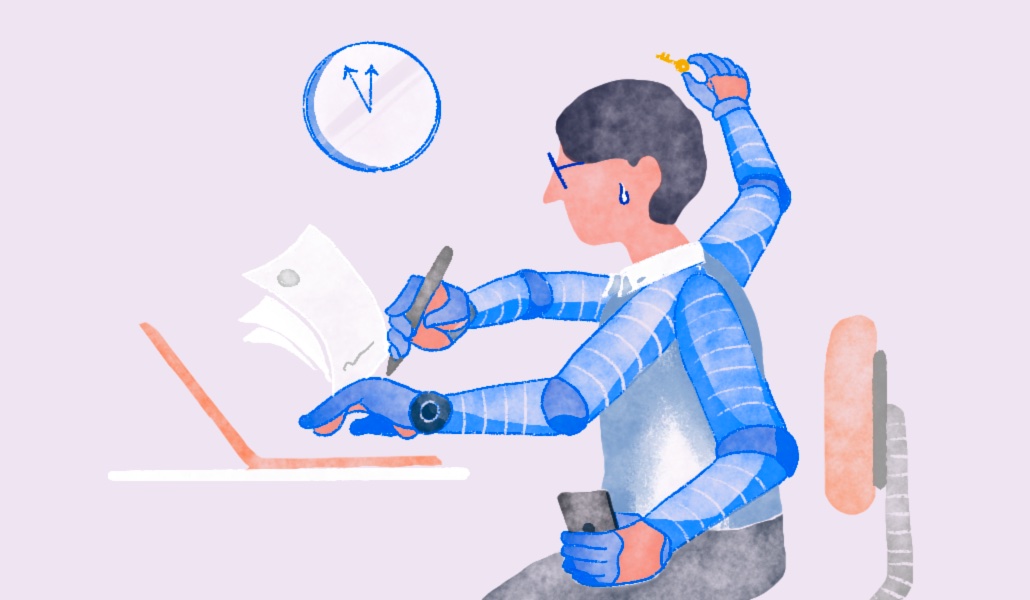Salesforce finds AI co-workers are officially here and people are OK with it

We are entering the era of the autonomous AI workplace. In other words, some of us officially have AI co-workers.
Autonomous AI is a branch of AI in which systems and tools are advanced enough to act with limited human oversight and involvement. That means that as we continue to use more AI tools and delegate work to bots, they will become workers themselves and end up being self-sufficient in many ways. They are AI agents, that interact with their environment, collect data, and use the data to perform self-determined tasks to meet predetermined goals.
Salesforce released new research this week on how nearly 6,000 global workers feel about an autonomous AI future. Surprisingly, most workers (77%) say that they will eventually trust a fully AI-powered future. Right now, 10% of global workers trust AI to operate autonomously, 26% will trust AI to operate autonomously in less than three years, and 41% in three or more years.
“We’re already really excited about what this can unlock,” said Paula Goldman, Salesforce’s chief ethical and humane use officer, at a press briefing. “We believe the key to getting to AI agents successfully and where it can operate, where you set it, let it go, and inspect it after, is really this thoughtful design of combining the best of human and machine intelligence for this era.”
The top three tasks that workers trust AI to do autonomously are write code, uncover data insights, and provide internal or external communications. Whereas the tasks humans are still responsible for include driving inclusivity, onboarding and training employees, and keeping data safe.
WorkLife reported in February that people are sending their AI assistants to meetings, leaving co-workers to wonder how much it will impact work relationships.
However, the research also found that while workers already trust AI to do almost half (43%) of their work tasks, there are some things that they would never delegate to AI.
“If we want people to trust and adopt technology, we need to enable people to use it successfully,” said Goldman. “This research shows us that knowledge and training can go a long way. As businesses, we need to lean into that.”
Despite this, some research shows that AI adoption is slowing. The Salesforce data found that workers who are knowledgeable about how AI is implemented and governed in their workplace are 5X more likely to trust AI to operate autonomously within the next two years. But 62% of global workers say more skill-building and training opportunities would build their trust in AI.
However, those early adopters are all-in on AI co-workers. For example, Michael Payne, senior research recruiter at Amazon Web Services, looks at his AI tools that way.
“I look at AI as my extra co-worker, as my friend,” said Payne. “I do treat it as another co-worker. Instead of pinging someone on my team saying ‘Hey, can you brainstorm with me on this?’ I just go to AI first and it’s so much faster than setting up a meeting.”
He’s also used AI tools to attend internal meetings and to find out when the best time to engage with prospects is externally.
Similar to what the report found, Payne won’t use it for everything. When he is engaged with a top talent or prospect, he won’t consider using AI as a tool because he wants to have an authentic interaction with that person.
“If I were to take that authenticity away through AI, that’s when I put the wall up of I’m not going to use it for the engagement or the human-to-human interaction I’m going to have with prospects externally,” said Payne.
Cliff Jurkiewicz, vp, global strategy and general manager, customer advisory board at Phenom, has also been keeping a close eye on how frequently AI agents are being used during workflow, agreeing that it will be commonplace eventually. He says that when a company has its own LLM, it’s easier for AI agents to be created so that it can leverage internal data and insights on a new level. Similar to training an actual co-worker, AI agents will also have to be trained to perform to their best ability.
“It’s learning more and more about the work that you’re doing as you’re doing it,” said Jurkiewicz. “So it becomes more intelligent and can provide you insight into the type of work you’re doing that you may not have seen before.”
Common tasks that AI co-workers might start with include analyzing a set of documents, emailing the relevant people in an organization topics for an upcoming meeting, and scheduling events.
But what happens if everyone sends their AI co-worker instead of themselves? Won’t there be nothing for the AI to capture? It’s reminiscent of the 1985 sci-fi film Real Genius, where students skipped class and placed their tape recorders in their seats instead. Eventually, the professor did the same and it was a room full of tape recorders. Is there a world where AI co-workers have their own conversations? Jurkiewicz says yes, but it goes back to training them on the right tasks like information gathering and staying away from innately human responsibilities like strategizing.
Then one question remains: “What is important to business is what does the human being do with all of this extra time we are giving them?” said Jurkiewicz. “That’s where the real value is going to be for the organization and the human being.”


